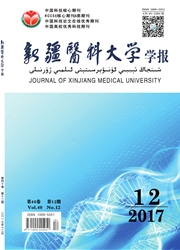

 中文摘要:
中文摘要:
目的:探讨和比较新疆哈萨克族和汉族食管癌患者FHIT基因甲基化状态及其与食管癌发生及预后之间的关系。方法:采用甲基化特异性PCR法(methvlation-specific polymerase chain reaction,MSF)测定哈、汉两民族共71例食管癌及癌旁组织标本FHIT基因启动子区甲基化状况,建立Cox回归模型分析临床病理指标及FHIT基因甲基化水平等因素与预后的关系。结果:36例哈族食管癌患者癌组织和癌旁组织的FHIT基因启动子甲基化率分别为58.3%和19.4%,35例汉族食管癌患者癌组织和癌旁组织的FHIT基因启动子甲基化率分别为51.4%和14.3%,两民族癌组织FHIT基因的甲基化率均明显高于癌旁组织(P〈0.01);哈、汉民族食管癌患者癌组织之间、癌旁组织之间FHIT基因启动子甲基化率无显著性差异(P〉0.05)。预后因素分析表明肿瘤浸润程度、TNM分期、淋巴结转移区域数是影响哈、汉民族食管癌预后的独立危险因素,女性性别是保护因素。结论:FHIT基因启动子区甲基化状态与新疆哈族、汉族食管癌的发生有密切的关系,但可能与食管癌预后无关。
 英文摘要:
英文摘要:
OBJECTIVE:To explore and compare the relationship between the hypermethylation status of FHIT gene and the occurrence and prognosis of esophageal carcinoma(EC)in Kazakh and Han ethnic groups in Xinjiang. METHODS:The hypermethylation of FHIT promoter region was detected by methylation specific polymerase chain reaction(MSP) in 71 cases of Kazakh and Han patients' esophageal cancer tissues.Cox model was established to analyze the possible factors influencing the prognosis of EC,including clinicopathological parameters and hypermethylation levels of FHIT promoter region.RESULTS:The methylation rates of FHIT promoter region in esophageal cancer tissues and adjacent tissues were 58.3%and 19.4%respectively,in 36 Kazakh patients,and 51.4%and 14.3%respectively,in 35 Han patients.Significant differences were seen in the methylation rates of FHIT promoter region in esophageal cancer and adjacent tissues(P0.05),but no differences between esophageal cancer and adjacent tissues in Kazakh and Han groups (P0.05).Multivariate prognostic analysis showed that the infiltration,TNM stage,the numbers of regional lymph node metastasis were independent risk factors,but female was a protective factor for esophageal carcinoma.CONCLUSION: Aberrant methylation of FHIT promoter region may play an important role in the pathogenesis of EC,but may have no relationship with the prognosis in Kazakh and Han ethnic groups.
 同期刊论文项目
同期刊论文项目
 同项目期刊论文
同项目期刊论文
 期刊信息
期刊信息
